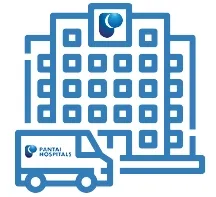Typically, stomach cancers develop gradually over the years. Pre-cancerous changes occur in the stomach's inner lining (mucosa) prior to the development of a true cancer.
What is stomach cancer?
Stomach cancer, also called gastric cancer, is an abnormal cell growth that starts in the stomach. While it can infect any area of the stomach, the main part of the stomach is where most stomach cancers form.
What are the types of stomach cancer?
There are four types of stomach cancer:
- Adenocarcinoma: The majority of stomach cancers (90-95%) are adenocarcinomas, which begins in the cells of the stomach lining. The intestinal type has a better prognosis, while the diffuse type spreads faster and is more challenging to treat.
- Lymphoma: Lymphoma refers to a tumour that starts in lymphocytes (immune system cells). Some of it may begin in the stomach wall, though it typically begins in other places of the body.
- Gastrointestinal stromal tumour (GIST): GIST is rare and typically starts in the stomach. However, it can develop anywhere in the digestive system.
- Neuroendocrine tumour: Neuroendocrine tumour develops from the cells of the neuroendocrine system. The majority of these tumours develop gradually and remain in the stomach, but some may spread quickly.
Causes: What are the risk factors for developing stomach cancer?
The exact cause of stomach cancer is unclear, but the following risk factors put you at a higher risk of developing it:
- Male gender
- Age 65 and above
- Infection with Helicobacter pylori (H. pylori), a type of bacteria
- Heavy smoking, excessive alcohol consumption
- Unhealthy diet:
- Diet rich in pickled, smoked, or salted food
- Diet low in vegetables, fresh fruits, vitamin C and A
- Stomach polyps (unusual growth of tissue)
- Long-term severe gastritis or acid-reflux
- Family history of stomach cancer: Family history of genetic syndromes that increase the risk of stomach cancer and other cancers, such as hereditary diffuse gastric cancer
- Genetic mutations such as HDC-1 mutations
What are the signs and symptoms of stomach cancer?
Given that symptoms of stomach cancer are rarely present, early stages detection may be challenging. Patients with advanced stomach cancer may experience the following symptoms:
- Nausea
- Vomiting
- Blood in the stool
- Heartburn
- Indigestion
- Loss of appetite
- Unexplained weight loss
- Pain in the upper part of your abdomen
- Lump at the upper part of your abdomen
- Dysphagia – inability to swallow
- Feeling full after consuming a small amount of food
- Tiredness or lethargy
If you're experiencing stomach pain or any other persistent symptoms listed above, it's important to be aware of stomach cancer signs.
You may have similar symptoms frequently if you have gastro-oesophageal reflux disease or other conditions, and you may become accustomed to them. However, you must visit a doctor if your symptoms change or worsen.
Detect: How do doctors diagnose stomach cancer?
Stomach cancer is diagnosed after performing several tests. Your doctor would initially ask about your general health and symptoms. Other tests may include:
- Blood tests
- Blood tests will be performed to test for anaemia due to stomach cancer bleeding and blood in the stool (faeces) that is not visible to the naked eye.
- Upper endoscopy
- Upper endoscopy is done to examine the oesophagus, stomach, and duodenum for abnormal areas. It is most commonly done by the doctor if a diagnosis of stomach cancer is suspected.
- A thin, lit tube called an endoscope is put into the oesophagus through the mouth and down the throat. During the procedure, a biopsy may be done whereby a small sample of tissue may be removed and sent to the laboratory to be examined. This procedure takes approximately 10 to 15 minutes.
- Computed tomography (CT) scan
- CT scan is useful to determine the location and extent of the spread of cancer. This procedure involves the use of X-rays to provide detailed, cross-sectional images of the soft tissues of the body.
- Endoscopic ultrasound
- This procedure is conducted to determine if cancer from the stomach lining has spread to the stomach wall, nearby lymph nodes or other nearby areas.
- Positron emission tomography (PET) scan
- PET scan aids in determining the extent of cancer spread to other parts of the body at once.
- Barium swallow
- This procedure is done to test for any abnormalities in the stomach and oesophagus. The procedure involves drinking a barium liquid on an empty stomach to make the stomach lining more visible on the X-ray. This procedure takes approximately 20 minutes.
- Laparoscopy
- A laparoscopy is a minor surgery that might be done if stomach cancer has been found and has not metastasised to other parts of the body.
- This can confirm that the cancer is still limited to the stomach, implying that surgery to remove it is still an option.
Learn more about the different types of screening and diagnostic procedures performed to diagnose stomach cancer.
Treatment: How is stomach cancer treated?
The course of stomach or gastric cancer treatment is determined by the location, size, stage, and type of cancer. The treatments typically used include radiotherapy, chemotherapy, and targeted therapy.
- Surgery is typically used in treating stomach cancer, especially if it is detected early, has not spread, or has not spread significantly. Surgery may be performed to remove the cancer, a part of the stomach and adjacent tissues that are also affected. Surgery may also be done to relieve an obstruction in the stomach to allow food to pass through easily.
- Chemotherapy utilises strong cancer-killing drugs to reduce the size of the tumour before surgery or to eradicate any leftover cancer cells after surgery. It is used to slow the spread of cancer and may be used alongside radiotherapy or targeted drug therapy. These therapies are carefully designed to destroy cancer cells and improve the chances of recovery.
- Radiotherapy employs high-energy radiation to reduce the size of tumours and kill cancer cells. This procedure is used to alleviate the symptoms of advanced cancer.
- Targeted therapy uses medications aimed at inhibiting the progression of advanced stomach cancer. Trastuzumab can be used for patients that have a high level of HER2 (a type of protein).
- Palliative care is an option in situations where treatment is not recommended, or cancer cannot be treated completely (metastatic stomach cancer), the goal is to maximise the quality of life by minimising signs and symptoms of cancer.
Learn more about the different types of treatment technologies to treat stomach cancer.
Prevent: What can I do to reduce the risk of developing stomach cancer?
While stomach cancer is not always preventable, there are steps you can take to help lower your risk of developing this condition, such as:
- Treat for H.pylori infection if you are tested positive
- Staying away from tobacco, including second-hand smoke
- Reduce the intake of alcohol
- Exercising regularly and maintaining an active lifestyle
- Eating healthy:
- Minimise the intake of fried and salty food
- Consume more vegetables and fruits

Do I need to get screened for stomach cancer?
There are currently no available routine screening tests for individuals at average risk. Therefore, it is important to check on symptoms and warning signs for early detection of stomach cancer. Maintaining a healthy lifestyle and getting regular health screenings is recommended.
Consult your doctor to determine if you would benefit from a stomach cancer screening.Make an appointment at Pantai Hospitals
Early detection of stomach cancer makes it easier to treat the disease with effective and appropriate treatment. A dedicated multidisciplinary team of specialists and oncologists at Pantai Hospitals is available for consultation to provide the best care and assistance to patients through screening, diagnosis, and treatment.
Get in touch with us to book an appointment today if you have any concerns or questions about stomach cancer treatment options.
Pantai Hospitals have been accredited by the Malaysian Society for Quality in Health (MSQH) for its commitment to patient safety and service quality.


 Request an Appointment
Request an Appointment.webp?sfvrsn=276ce14_1/vector-(3).webp) International Patient
International Patient

.webp)


 Find A Doctor
Find A Doctor


.png?sfvrsn=71934c60_8)
.png?sfvrsn=1370dfbd_9)






